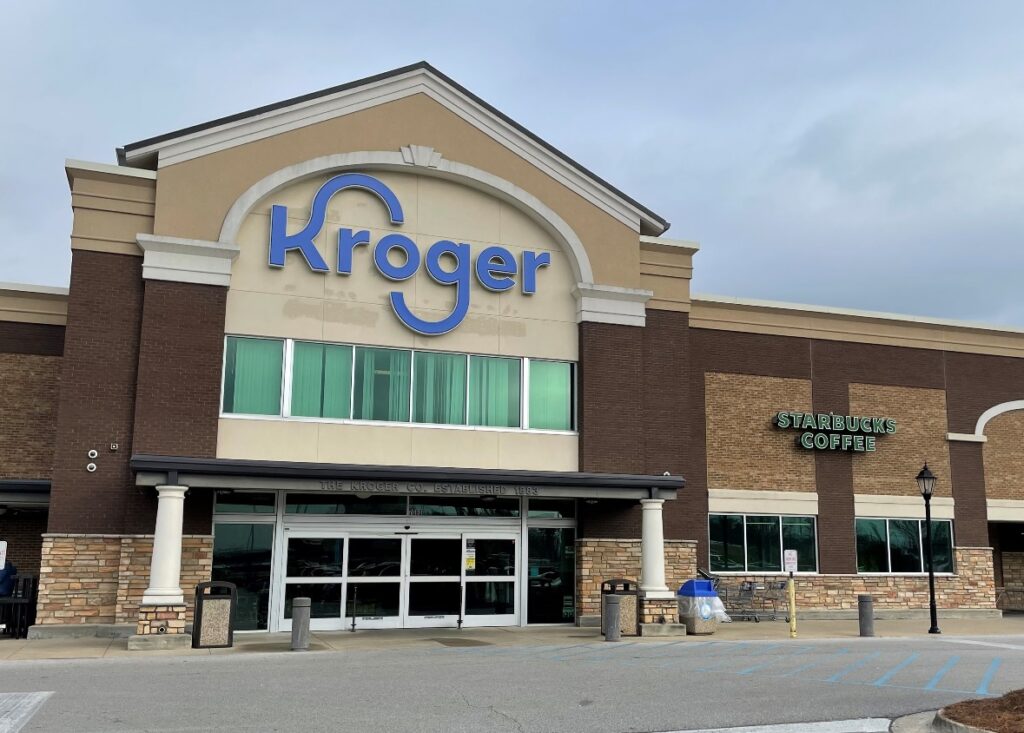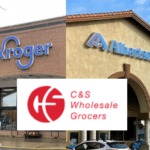
In case you didn’t get the message the first time Kroger mentioned it 16 months ago, its planned merger with Albertsons won’t result in a monopolistic, competition-destroying behemoth, but better stores and lower prices for everyone. For real!
Kroger “shared additional insights” about its pricing plans, in an announcement this morning, pointing to previous mergers that it says resulted in lower prices.
After acquiring Harris Teeter in 2014, Kroger says it invested more than $125 million to lower prices. Its acquisition of Roundy’s two years later resulted in a similar $100 million investment. In both cases, Kroger says it also invested more than $2 million per store “to enhance the customer experience.” The spending actually contributed to a decline in the company’s gross margin over the years by 5%, Kroger says, as compared to competitors Amazon, Ahold Delhaize, Dollar General and Walmart, all of which increased their gross margins over the same period by 22%, 4%, 2% and 1%, respectively.
So the retailer plans to follow the same roadmap if and when its planned merger with Albertsons goes through. “Kroger will invest $500 million to lower prices following the merger with Albertsons starting day one following the transaction close,” today’s announcement reads. “Kroger will also invest $1.3 billion to improve Albertsons’ stores following the merger, all to better serve customers.”
That part isn’t new – on the day of its October 2022 announcement that it planned to purchase Albertsons, Kroger made the same pledge about how much it expected to invest in lower prices and better stores. So it’s unclear what prompted Kroger to reiterate its promises today.
The fact that the planned merger is coming under greater scrutiny surely has something to do with it. Kroger originally had hoped the deal would be sealed by now, but the Federal Trade Commission is still considering it. Consumer groups have sued to stop it, as has Washington state’s Attorney General.
A merger will mean “shoppers will have fewer choices and less competition,” Washington Attorney General Bob Ferguson said in announcing his lawsuit last month. “And without a competitive marketplace, they will pay higher prices at the grocery store. That’s not right.”
Ask Harris Teeter and Roundy’s shoppers, though, and they may tell you that even if the merger does result in lower prices, that doesn’t always tell the whole story. Harris Teeter and Roundy’s-owned Mariano’s were known as higher-end grocery stores before Kroger took over. Now some shoppers complain that lower prices have also resulted in lower-end stores.
“Harris Teeter used to be so much better before Kroger bought them out,” one Yelp reviewer writes. “I feel like quality has gone down since the Kroger buyout,” another added. A third commenter observed that “everything is gone down in this store since Kroger bought them out, I rarely go in there anymore.” And another curiously wondered “why does every Harris Teeter smell like fish since Kroger bought Harris Teeter?”
Many Mariano’s customers are similarly unimpressed. “Kroger bought Mariano’s and basically ruined it, to the point where their stores are so gross now that I won’t even walk into a Mariano’s anymore,” a Yelp reviewer wrote. “When Kroger bought out Mariano’s, this place fell off a cliff. It used to be a nice grocery store,” another wrote.
Left unsaid in Kroger’s announcement is another impact of previous mergers – the fate of stores that had to be divested. In areas where they overlap, Kroger and Albertsons plan to sell off more than 400 stores to C&S Wholesale Grocers, which currently operates less than two dozen grocery stores and is poised to find its retail holdings growing nearly twentyfold in an instant. When Albertsons bought out Safeway back in 2014, it sold nearly 150 stores to the similarly-small Haggen, which quickly found itself overwhelmed, went bankrupt, sold most of the stores back to Albertsons for a song, and ultimately ended up getting acquired by Albertsons.
But Kroger’s announcement this morning focuses on the bright side – all the better to help sway public opinion and, perhaps, regulatory sentiment to its side. “We believe the way to be America’s best grocer is to provide great value by consistently lowering prices and offering more choices,” Kroger CEO Rodney McMullen said in a statement. “We know this model works because we’ve been doing it successfully for many years, and this is exactly what this merger will bring customers – lower prices and more fresh, affordable choices.”
Kroger’s once-optimistic goal of having the merger completed by early 2024, has now been shifted to as late as August, as federal regulators continue weighing whether to approve it. If they do, it will be up to shoppers to decide whether lower prices, fewer choices and the risk that upscale stores could end up going downhill, will be worth it.
Image source: Kroger
















I agree with the point in the story about Kroger lowers everything to their standards. I used to show at Harris Teeter in SC. When the merger took place, the first thing to go was double coupons. Then they started closing at 11:00 instead of being open 24 hours.Then the Buy 2 Get 3 Free went away. Before long, it was a high end store in name only. I started shopping exclusively at Publix.
Then there’s the merger. It seems like a textbook case of anti-trust. They are the two largest grocery chains in America and by merging, they can set prices low enough to drive competitors away; kind of like what Walmart does when they open a new Supercenter.
They gave another reason not to support the merger: Their gross margin went down 5% after lowering prices with other mergers. That makes them less stable and, when they’ll practically be the only grocer in town in many areas, very risky to lose that one main food source. Too many ‘eggs’ will be in one basket in too many communities.
Where I live they will be the main grocer in the area doubling in size. People will lose all the sales from Albertsons each week and only have the ones from the Kroger. That is less choice which will lead to higher prices.
This merger should not happen from Colorado westward where Kroger and Albertsons are the main grocers in those areas.
This is funny. What’s going to happen when they don’t lower prices?